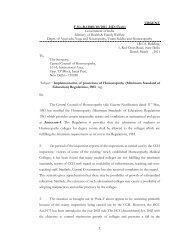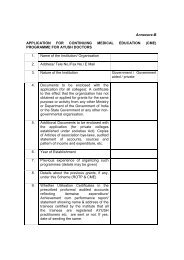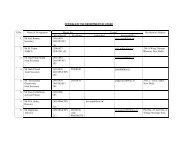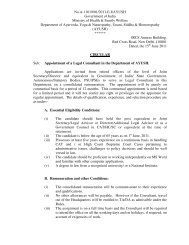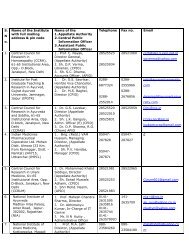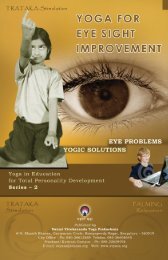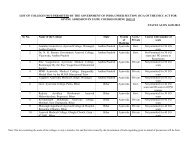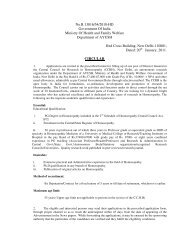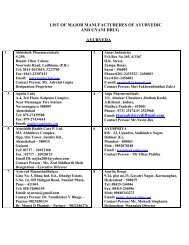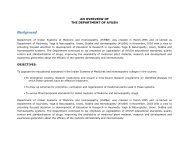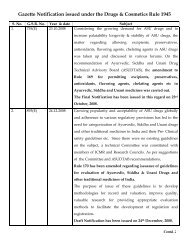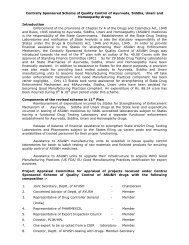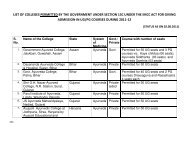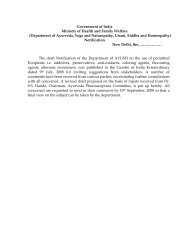Ayurvedic system of medicine is of great antiquity - Department of ...
Ayurvedic system of medicine is of great antiquity - Department of ...
Ayurvedic system of medicine is of great antiquity - Department of ...
You also want an ePaper? Increase the reach of your titles
YUMPU automatically turns print PDFs into web optimized ePapers that Google loves.
� Construct an herbal garden network<br />
and link up all the herbal gardens to<br />
th<strong>is</strong> net.<br />
� Data base development on number <strong>of</strong><br />
species, availability <strong>of</strong> planting<br />
material, quantity <strong>of</strong> the available<br />
planting material, cost <strong>of</strong> planting<br />
material etc. from different herbal<br />
gardens <strong>of</strong> India will be maintained<br />
under th<strong>is</strong> umbrella.<br />
� Structuring <strong>of</strong> information<br />
� Development <strong>of</strong> web based s<strong>of</strong>tware<br />
package<br />
� Provide online information about the<br />
herbal gardens and facilitate the<br />
exchange <strong>of</strong> medicinal species among<br />
the member herbal gardens within the<br />
country.<br />
(vi) D<strong>is</strong>semination <strong>of</strong> information on marketing<br />
<strong>of</strong> medicinal plants:<br />
D<strong>is</strong>semination <strong>of</strong> market information <strong>is</strong><br />
the key to promoting cultivation and marketing<br />
<strong>of</strong> the produce. For th<strong>is</strong> purpose the Board has<br />
developed e-portal which seeks to d<strong>is</strong>seminate<br />
information on medicinal plants and their prices<br />
in various mandies on a weekly bas<strong>is</strong>. The<br />
portal can also function as a virtual mandi for<br />
trading medicinal plants by exchange <strong>of</strong><br />
information between buyers and sellers. The<br />
activity was further continued through fresh<br />
projects/ implemented in collaboration with<br />
WHO for procurement / collection <strong>of</strong> information<br />
on market prices <strong>of</strong> about 100 commercially<br />
important plants from different mandies and<br />
trade centres, analyse for wider d<strong>is</strong>semination<br />
and market promotion.<br />
(vii) Database on quantum <strong>of</strong> raw material<br />
used by ASU Industry:<br />
Information regarding quantum <strong>of</strong> raw<br />
material consumed for preparation <strong>of</strong> <strong>medicine</strong>s<br />
by ASU industry <strong>is</strong> felt required for planning <strong>of</strong><br />
developmental activities. The <strong>Department</strong> <strong>of</strong><br />
AYUSH has <strong>is</strong>sued notification making<br />
mandatory for ASU Industry to provide th<strong>is</strong><br />
information to NMPB or an agency appointed<br />
by it by 30 th June <strong>of</strong> every year. The work was<br />
initiated for identification <strong>of</strong> agency to collect,<br />
compile and maintain the information in respect<br />
<strong>of</strong> all ASU Industry units.<br />
Creation <strong>of</strong> Awareness and d<strong>is</strong>semination <strong>of</strong><br />
information<br />
* Brochures, posters, bulletins and e-book etc.<br />
cons<strong>is</strong>ting <strong>of</strong> information on cultivation,<br />
10<br />
therapeutic values, cultivation economics and<br />
objectives/ activities <strong>of</strong> Medicinal Plants Board<br />
were prepared for wider d<strong>is</strong>semination.<br />
* Participated in Arogya and other Health<br />
Mela’s for propagation <strong>of</strong> information through<br />
d<strong>is</strong>play and d<strong>is</strong>tribution <strong>of</strong> publicity material<br />
relating to development <strong>of</strong> medicinal plants<br />
sector and schemes <strong>of</strong> NMPB.<br />
D. RESEARCH COUNCILS:<br />
The Central Council for Research in<br />
Indian Medicine and Homoeopathy (CCRIMH)<br />
was establ<strong>is</strong>hed in 1969 to carry out research in<br />
Ayurveda, Siddha, Unani, Yoga and<br />
Homoeopathy under the Min<strong>is</strong>try <strong>of</strong> Health and<br />
Family Welfare. Later, in 1978, th<strong>is</strong> composite<br />
Council was d<strong>is</strong>solved to pave the way for the<br />
formation <strong>of</strong> four independent Research<br />
Councils, one each for Ayurveda and Siddha,<br />
Unani, Homoeopathy and Yoga and<br />
Naturopathy. The four successor Research<br />
Councils were establ<strong>is</strong>hed as autonomous<br />
organizations reg<strong>is</strong>tered under Societies Act, to<br />
initiate, guide, develop and coordinate scientific<br />
research, both fundamental and applied, in<br />
different aspects <strong>of</strong> their respective <strong>system</strong>s.<br />
The Research Councils, which are fully<br />
financed by the Government <strong>of</strong> India, are the<br />
apex bodies for scientific research in the<br />
concerned <strong>system</strong>s <strong>of</strong> <strong>medicine</strong>. The research<br />
activities <strong>of</strong> the Research Councils are<br />
monitored and reviewed periodically in order to<br />
ensure that the research <strong>is</strong> focused and that it<br />
<strong>is</strong> undertaken in a time bound manner. The<br />
outputs <strong>of</strong> the research studies are<br />
d<strong>is</strong>seminated among education<strong>is</strong>ts,<br />
researchers, physicians, manufacturers and the<br />
common man.<br />
(i) Central Council for Research in Ayurveda<br />
and Siddha (CCRAS):<br />
The Central Council for Research in<br />
Ayurveda and Siddha an apex body for the<br />
formulation, coordination and development <strong>of</strong><br />
research in Ayurveda and Siddha on scientific<br />
lines was establ<strong>is</strong>hed in 1978 (website :<br />
www.ccras.nic.in),. The research activities <strong>of</strong><br />
the CCRAS are carried out through 35<br />
Institutes/Centres/Units located all over India<br />
and also through collaborative studies with<br />
various ISM Institutions/Hospitals and premier<br />
modern <strong>medicine</strong> institutions and Hospitals.<br />
These units include 10 Central Research<br />
Institutes, 14 Regional Research Institutes, 2<br />
Siddha Clinical Research Units, 2 Drug



